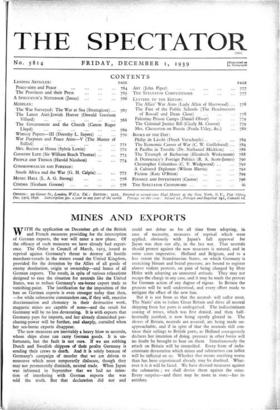MINES AND EXPORTS
WITH the application on December 4th of the British and French measures providing for the interception of German exports, the war will enter a new phase. Of the efficacy of such measures we have already had experi- ence. The Order in Council of March, 1915, issued as reprisal against Germany's threat to destroy all hostile merchant-vessels in the waters round the United Kingdom, provided for the detention by the Allies of all goods of enemy destination, origin or ownership—and hence of all German exports. The result, in spite of various relaxations designed to ease the situation for neutrals like the United States, was to reduce Germany's sea-borne export trade to vanishing-point. The justification for the imposition of the ban on German exports is even stronger today than then, —for while submarine commanders can, if they will, exercise discrimination and clemency in their destructive work, magnetic mines are capable of none—and the result for Germany will be no less devastating. It is with exports that Germany pays for imports, and her already diminished pur- chasing-power will be further, and sharply, curtailed when her sea-borne exports disappear.
The new measures are inevitably a heavy blow to neutrals, whose ships alone can carry German goods. It is un- fortunate, but the fault is not ours. If we are robbing Dutch and Swedish shippers of their profits Germany is sending their crews to death. And it is solely because of Germany's campaign of murder that we are driven to measures which must temporarily dislocate, though they may not permanently diminish, neutral trade. When Japan was informed in September that we had no inten- tion of interfering with German exports she was told the truth. But that declaration did not and could not debar us for all time from adopting, in case of necessity, measures of reprisal which were applied, obviously with Japan's full approval for Japan was then our ally, in the last war. That neutrals should protest against the new measures is natural, and in some cases imperative. Holland and Belgium, and to a less extent the Scandinavian States, on which Germany is exercising blatant and brutal pressure, arc bound to register almost violent protests, on pain of being charged by Herr Hitler with adopting an unneutral attitude. They may not escape the charge in any case, and it may be made the pretext for German action of any degree of rigour. In Britain the protests will be well understood, and every effort made to mitigate the effect of the new ban.
But it is not from us that the neutrals will suffer most. The Nazis' aim to isolate Great Britain and drive all neutral shipping from her ports is undisguised. The indiscriminate sowing of mines, which was first denied, and then half- heartedly justified, is now being openly gloried in. The shores of Britain, neutrals are assured, are being made un- approachable, and if in spite of that the neutrals still con- tinue their sailings to British ports, as Holland courageously declares her intention of doing, pressure in other forms will no doubt be brought to bear on them. Simultaneously the attack on Britain will be intensified. Every form of indis- criminate devastation which mines and submarines can inflict will be inflicted on us. Whether that means anything worse than has been experienced already may be doubted. What- ever it is it will be faced. We have devised measures against the submarine ; we shall devise them against the mine. Every surprise—and there may be more in store—has its antidote.












































